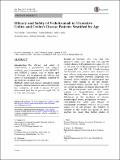Efficacy and Safety of Vedolizumab in Ulcerative Colitis and Crohn’s Disease Patients Stratified by Age

View/
Author
Khan, Nabeel
Dubinsky, Marla
Axler, Jeffrey
James, Alexandra
Abhyankar, Brihad
Lasch, Karen
Published Version
https://doi.org/10.1007/s12325-016-0467-6Metadata
Show full item recordCitation
Yajnik, Vijay, Nabeel Khan, Marla Dubinsky, Jeffrey Axler, Alexandra James, Brihad Abhyankar, and Karen Lasch. 2017. “Efficacy and Safety of Vedolizumab in Ulcerative Colitis and Crohn’s Disease Patients Stratified by Age.” Advances in Therapy 34 (2): 542-559. doi:10.1007/s12325-016-0467-6. http://dx.doi.org/10.1007/s12325-016-0467-6.Abstract
Introduction: The efficacy and safety of vedolizumab, a gut-selective α4β7 integrin antibody, were demonstrated in the GEMINI 1 and GEMINI 2 clinical trials of adults aged 18–80 years. We investigated the efficacy and safety of vedolizumab in patients stratified by age from the GEMINI trials. Methods: Safety and efficacy, including clinical response, clinical remission, and corticosteroid-free remission, at week 6 and/or 52 were determined post hoc in patients aged <35, 35 to <55, and ≥55 years. Results: At baseline, 353, 412, and 130 ulcerative colitis (UC) and 582, 443, and 90 Crohn’s disease (CD) patients were aged <35, 35 to <55, and ≥55. Of these patients, 56 were aged ≥65 years (UC: 33, CD: 23). Trends favoring vedolizumab over placebo were observed for most efficacy endpoints irrespective of patient age; some variability between subgroups was observed. Safety profiles of vedolizumab and placebo were similar in all age groups. Vedolizumab-treated patients aged ≥55 had the lowest incidence of serious infections (0.9 per 100 person–years) and adverse events leading to hospitalization (14.8 per 100 person–years). There were no age-related differences in the incidence of adverse hematological events, malignancy, or death. Conclusions: The safety and efficacy of vedolizumab in patients with UC or CD were similar for all age groups. The number of patients in the oldest age group in these analyses was small; thus further studies of vedolizumab in larger cohorts of elderly patients are warranted. Funding Millennium Pharmaceuticals, Inc. (d/b/a Takeda Pharmaceuticals International Co.). Electronic supplementary material The online version of this article (doi:10.1007/s12325-016-0467-6) contains supplementary material, which is available to authorized users.Other Sources
http://www.ncbi.nlm.nih.gov/pmc/articles/PMC5331094/pdf/Terms of Use
This article is made available under the terms and conditions applicable to Other Posted Material, as set forth at http://nrs.harvard.edu/urn-3:HUL.InstRepos:dash.current.terms-of-use#LAACitable link to this page
http://nrs.harvard.edu/urn-3:HUL.InstRepos:32071897
Collections
- HMS Scholarly Articles [17920]
Contact administrator regarding this item (to report mistakes or request changes)


